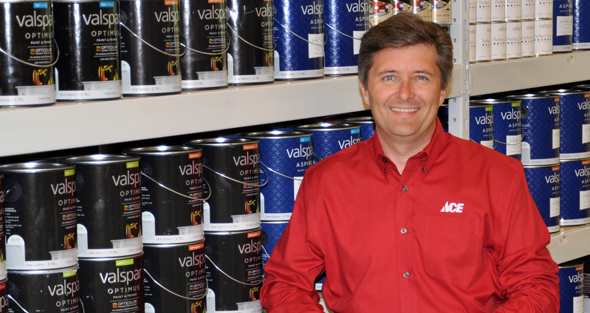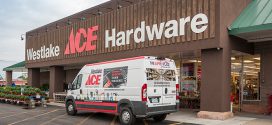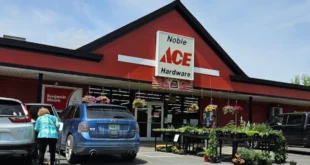Eight years ago, when Hardware Retailing magazine, the North American Retail HardwareAssociation (NRHA) and the NationalHardware Show® set out to showcase the industry’s elite independent retailers by honoring them with a special award, we knew the field of candidates would be deep.
Throughout the years, the ranks of Industry Top Guns have been true representations of the diversity found throughout the independent segment of home improvement retailing. Past honorees have ranged from relative industry newcomers running rural stores to veterans operating large-scale home center operations.
So it is with great pride that we introduce you to one of this year’s Industry Top Guns, Michael Wynn, representing Sunshine Ace Hardware with six retail locations throughout Florida.
A representative of a long-standing family business, Michael Wynn is the latest in a long line of home improvement retailing pioneers.
As president of Sunshine Ace, Wynn has helped guide the company in new retail directions through leading-edge merchandising, store design and technological advancements, all of which add to the chain’s local appeal.
Below is an excerpt from his Q&A with Hardware Retailing editors.
Hardware Retailing (HR): Could you please give us a little background on your business including how you first got involved in the business?
Michael Wynn (MW): Our business began in 1958 when my grandfather, Don Wynn, purchased a Western Auto Parts store. He quickly began changing the product mix as customers expressed a need for a larger hardware selection. Soon the store was transformed into more of a traditional hardware store business. In 1964, we relocated as part of a significant expansion and joined the Ace co-operative. Over time our business grew to six locations including stores in Marco Island, Naples and Fort Myers.
I was originally brought into the business at the age of 19 to help with a technology project. We had two separate Triad servers, each running different stores. It was my job to synchronize the data and merge the databases into one. It’s now been 23 years and I have never had a hard time finding new projects to keep myself busy!
HR: What is it that you would say sets your retail operation apart from the competition?
MW: Culture. It drives everything else. From how we connect with and serve the unique needs of our community, to the high standards we set for the customer experience and maintaining core values in our business. As Peter Drucker stated, “Culture eats strategy for breakfast.” When you build a defined and sustainable culture, you attract the right associates, and you drive the behaviors that create the shopping environment your customers desire.
HR: Over the last five years, what would you say have been the most dramatic changes for your business? What about the most dramatic changes for the home improvement industry at large?
MW: Over the last five years, I think the most dramatic change for both our business has been the evolving role of technology and mobile devices. Mobile technology has allowed us to not only increase efficiencies, but also create a higher level of interaction between team members and our customers. Through the use of more sophisticated software, we have been able to redistribute payroll dollars from back office functions and inventory management to the front line, all while increasing key performance indicators.
The industry at large has seen a significant change in consumers’ behavior as new technology tools have increasingly shifted power to them. This involves everything from increased pricing transparency, to expanded online choices, as well as redefining what consumers understand as true convenience. Social media has also completely changed brand management. Our brand is increasingly shaped by the opinions consumers share online and how we respond to those comments. No longer does a bad shopping experience get shared with 20 people—it gets shared with the world.
HR: What do you feel have been the keys to your operation’s ability to grow and thrive over the years?
MW: The most significant key to our success has been our people. From attracting the right leaders for our store manager positions, to finding associates that genuinely have a heart to serve others—they continue to be our biggest competitive advantage in winning customers every day.
Maintaining a humble spirit has been another key to our success. Specifically our willingness to never be too proud to change and always believing that there is a better way to do something. Being humble helps you become a better listener to your associates, your customers, and your community. If you are truly connected to them and react to their needs—you will always remain relevant and grow.
One of our core values is to drive results. Every year we clearly define goals that are time specific, achievable and measurable. We communicate those goals at our company’s annual meeting and throughout the month in huddles, manager meetings, our communication board, etc. We take great pride in not only achieving but exceeding our goals. Our people know how we are defining success for the company and they help make it happen.
We were also fortunate in choosing the right brand and wholesaler to fight the big boxes against. Not only is Ace one of the most recognized brands in the world but the support they provide our business has been critical in allowing us to focus more and more on improving the customer experience in our stores.
HR: You and your team have chosen to make a lot of investments into things such as niche areas, enhanced signage and decor, retail technologies, etc. What goes into the thought process of making these kinds of investments? How would you advise other retailers to approach the process of making strategic investments?
MW: First, we try not to limit ourselves in the ideas that we explore, so we can sometimes come up with some outlandish ideas. However, depending on the idea, we may seek out experts in the industry like NRHA or the Farnsworth Group to see what research is available to help support the direction we are thinking of moving towards. Next, we will reach out to industry leaders or other retailers that may have extensive experience in that area. What lessons have they learned? What failures can we learn from and avoid? Using that information, we make an educated guess on what we think the return will be if the idea is successful.
We will then typically find a store manager who is passionate about the project and wants to own it. We demo it in their store, measure the results and document any issues or customer feedback. Finally, (assuming it has been successful) we create a very detailed documented procedure and roll out to our other locations. I would advise other retailers to be quick to pilot new ideas, slow to prove and then highly disciplined in their implementation.
We encourage our stores to be mini laboratories and experiment with ideas that they think will either solve current issues or just improve the shopping experience. Managers need only to bring the idea, a proposed budget and desired result to us for approval. Often times it is the simple, inexpensive ideas that prove to have the biggest impact, and we celebrate those successes with their teams. That only encourages the innovative process to continue.
HR: What unique challenges do you think independent retailers such as yourself face in today’s market?
We are living in a world where consumers interact with and rely on their technology to guide their decision-making process on virtually everything. The big boxes have significant resources and talent to help them connect their stores with technology that constantly evolves to offer solutions that are highly relevant to the unique needs of that individual customer.
If we do not quickly find a way to connect our customer’s purchase history, metadata and browsing history with technology that suggests relevant and unique solutions we offer in our stores, it will simply be more and more convenient to shop with our competition. While we must always be sensitive to the privacy rights of our customers, if we are not building this capability alongside our competitors, we will find ourselves unable to offer something that many consumers will highly value.
HR: What would you say is the greatest asset that independent retailers have at their disposal?
MW: People-focused, family-centric cultures are difficult to create. The larger you are, the more difficult it is to consistently communicate those values and execute them each and every day. This a great opportunity for us to use the big boxes’ size against them.
The advantage we have is that because so many of our families grew up in the business and we managed the business like an extended family, we have already built a culture that our competition is envious of. It attracts people who want to serve and help others. It promotes the environment where relationships are important and quickly formed with new customers. The key is to define that culture, and build systems in your business that ensure it can survive and be sustained.
Many of our businesses are entering a time where that unique culture will be at risk with many older, long-term employees retiring or aging owners looking to make succession plans—the people that have helped perpetuate and preach those values will soon be leaving the industry.
HR: How would you respond to the statement “independent retailers just can’t compete against the big boxes or Internet”?
MW: Independent retailers who aren’t willing to transform their internal systems, increase the level of engagement they have with their associates and innovate based on the local needs of their community are the ones that will not be able to compete. Those who are willing to exist in a state of constant evolution will have a long future ahead of them.
We will always have an advantage over the big boxes if we remember one thing: People do business with people. Relationships matter. That’s why you have to be fanatical about the work environment you create so that only the best people have the privilege of working for you and interacting with your valued customers.
HR: What would you say is the favorite part of your job?
MW: We are fortunate to have been in business now for over 55 years. As our business has grown, we have had the opportunity to play a bigger role in serving our community. Seeing the impact we are able to have on people’s lives or in being a significant contributor to a project that’s important to the community is very rewarding. One of the best parts of the job is that I am in a position to help and serve others and then witness the direct impact of that help.
Another part of the job that I love is setting challenging goals as a team that may at first seem impossible. Then working hard together, sometimes over several years to achieve that objective. The feeling of accomplishment and camaraderie that develops through that process is invigorating and fuels our competitive spirit.
HR: What would you say is the most challenging part of your job?
MW: Selecting the very best people that truly fit the unique culture of our company. We continue to revamp our hiring process, behavioral/personality testing and onboarding to filter down to the best candidates.
You are involved in a lot of industry organizations and groups outside your own business. Why do you feel your involvement in these groups (like BIG, boards of directors, etc.) makes this involvement worth your time?
We live in a world of rapid change. It is my belief that you need a strong network of external advisers and industry experts to stay ahead of the competition and the dynamic business environment. For me, these industry organizations or peer groups really act as an external brain trust and accountability group. They challenge me, inform me and help remove the emotion that can sometimes cloud the best decision making.
HR: If you could wave a magic wand and change one thing about the home improvement industry, what would it be?
MW: Magic, huh? Well, assuming we have magic in hand, I would want to increase the level of sophistication we see across our industry and niche categories. Ideally we would have all vendors EDI capable to streamline back office operations. In addition, I would create a universal database containing all products and their related core data (including high-resolution photos) that would seamlessly integrate into our system. The database would also include true substitute SKUs for each product. This would allow more payroll dollars to be dedicated to the customer experience versus admin.
HR: Where would you like to see your business in five years?
MW: Our business will continue to focus on two key differentiators over the next five years: company culture and the shopping experience. While we will have to be best in class in pricing, merchandising, product selection and in stock condition, I believe these will simply be minimum expectations from our customers. What will give us our true competitive advantage is building a service environment that is tangible to the customer when they first walk through the doors. We also want to create an environment that through unique decor, store events and delightful surprises from our associates will provide an entertaining shopping experience for our customers. Ideally each visit will be unique in some way, even to our most frequent shoppers.
HR: Where do you see the home improvement industry in five years?
MW: In five years, I see an industry with smaller store footprints, seamless technology integration with consumers and complete price transparency. Consumers will have access to the unique product details of all their home maintenance items and equipment. We will not only need to offer a technology solution to provide for the automatic ordering and delivery of those items, but also service the replacement of those items should the customer choose. In-stock condition will become absolutely essential as consumers will easily switch to online competition when they show up and find you out of stock. With same-day delivery from companies like Amazon, consumers will not offer us a second chance.
Technology will continue to evolve to make it easier for consumers to analyze their monthly purchases and see where savings exists from other suppliers. Repeat maintenance items and consumables will be easier to have just show up on the door from the lowest cost provider. Convenience as we have known it will be redefined. If you are not a low price leader, you will have to create an emotional connection with your customers and provide a truly distinct shopping experience in order to be successful.
HR: What advice would you give to someone considering entering the home improvement retailing industry today?
MW: Whether you are a sole owner or not, you are going to need numerous partners to be successful. Who you select as your wholesaler is going to be the most important decision you make. Research carefully and make sure you choose one that matches the vision you have for your business.
Find industry leaders in non-competing markets that can serve as your minority partners. Be prepared to do a lot of listening and share liberally. They will provide the objective advice that although tough to hear, will help your business not only survive but thrive.
 Hardware Retailing The Industry's Source for Insights and Information
Hardware Retailing The Industry's Source for Insights and Information












